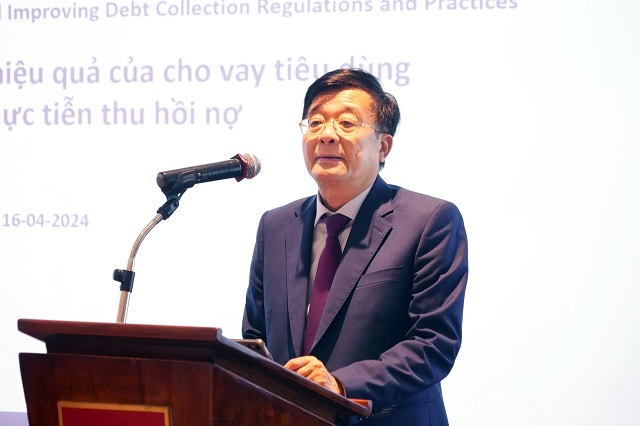On April 16th, the Vietnam Bank Association (VNBA) organized a workshop entitled “Promoting Credit Health and Debt Collection Regulations and Practices” in association with the International Financial Corporation (IFC).
According to VNBA statistics till the end of 2023, consumer credit accounted for roughly 21% of total outstanding loans to the economy, amounting to nearly 2.9 million billion VND, a significant figure. The entire system consists of 15 consumer finance companies authorized and regulated by the State Bank of Vietnam (SBV). As of the end of February 2024, consumer loans issued by finance companies totaled approximately 138.8 trillion VND, representing around 5% of total consumer credit in the system.
Hence, it is evident that capital from banks has met consumer demand for purchases, supported the public’s lifestyle, and powered businesses. This has stimulated demand and facilitated economic growth while diminishing the extent and influence of illicit lending. Nevertheless, despite stringent efforts by regulatory bodies to dismantle numerous underground lending rings, illicit lending remains pervasive in society and eradication is yet to be achieved.

Mr. Nguyen Quoc Hung, Vice Chairman and Secretary-General of the Vietnam Bank Association (VNBA) – Photo: VGP/HT
|
As of the end of February 2024, consumer credit growth was negative (declining 2.5% compared with December 31st, 2023). According to Mr. Nguyen Quoc Hung, Vice Chairman and Secretary-General of the Vietnam Bank Association (VNBA), the primary cause of negative consumer credit growth is decreasing demand for consumer credit. This is driven by the challenging economic climate, which has impacted individual and household incomes, resulting in increased saving for future contingencies and reduced demand for credit to fund spending.
Additionally, the proliferation of lending platforms through mobile applications with relaxed lending criteria, streamlined procedures, easy accessibility, and minimal requirements for collateral has attracted individuals towards borrowing through apps rather than turning to banks.
During the workshop, banking experts also noted the current deterioration in consumer credit quality. Bad debt handling and recovery by credit institutions, especially finance companies, is facing significant challenges. Many companies have plunged into losses due to increased provisioning for risk.
Given these circumstances, the delegates expressed their hope for positive change. With the integration of digital identification, personal credit scoring will be enhanced, leading to greater awareness and responsibility among the public. Simultaneously, the legal framework for debt collection needs to be finalized promptly so that debt collection can be facilitated more smoothly and effectively.
Analyzing the issue of bad debt further, Mr. Nguyen Quoc Hung stated that in addition to the external factors influenced by the overall economic climate, there are also internal factors arising from customers intentionally defaulting on loans and organizing “debt cancellation” groups on social media, hindering the efforts of debt collectors and negatively impacting the reputation of banks and finance companies, as well as the morale of debt collectors.
Therefore, it is essential to tackle the growing problem of illegal business activities that overshadow legitimate finance companies, and even enjoy legal advantages and punitive measures for debt collection and controlling unauthorized finance companies.
From a regulatory perspective, a representative from the State Bank of Vietnam Supervision Authority proposes enacting a separate law on the protection of financial consumers. The Consumer Protection Department under the Ministry of Industry and Trade can only handle general matters and has limited impact on this specific sector.
Currently, Vietnam has laws on deposit insurance and depositor protection. However, there is no specific mechanism to protect borrowers. Thus, it is necessary to regulate the relationship between financial service providers and borrowers. Only fundamental principles have been legislated so far. Circular 43 specifies consumer lending by finance companies, and Circular 18 amends several provisions of Circular 43 (adjusting it to align with the investment law and ensure legal consistency).
Circular 43, issued by the State Bank of Vietnam after extensive consultation and with reference to the practices of many countries, establishes rules for transparent interest rate disclosure and protocols for debt collection and reminders. However, the State Bank of Vietnam representative acknowledges the existence of limitations imposed by legal documents.
“We need a code of conduct that encompasses more than just debt collection. Perhaps industry associations could establish agreements and implement them consistently to improve market health. Consumers need to understand the clear benefits of borrowing from the formal market, where they enjoy more robust legal protection. Finance operates on mutual trust and confidence. To protect both lenders and borrowers effectively, we must have specific and detailed regulations in this sector,” stated the State Bank of Vietnam representative.
Echoing this view, Mr. Moon Youngso, CEO of Welcome Credit Acquisition Company Limited, emphasized the need for a code of conduct for debt collection activities.
“This code of conduct would guide employees, businesses, and customers to conduct transactions that meet social standards and comply with legal regulations. For customers, it would ensure that debt collection measures are implemented fairly and transparently. For businesses, it would reduce risks, increase debt collection efficiency, and ensure that all their operations adhere to ethical standards and legal frameworks. Moreover, a code of conduct fosters a more effective, sustainable, and secure business environment,” suggested Mr. Moon Youngso.
During the workshop, delegates proposed solutions to improve policy documents in line with the specific characteristics of consumer finance, create a level playing field, and implement forward-thinking policies. They also called for enabling finance companies to leverage technology, develop innovative products, diversify product portfolios, and enhance customer outreach and experience.















